The Winnipeg Jets and Los Angeles Kings swung a big trade Tuesday, with the Jets exchanging disgruntled power forward Pierre-Luc Dubois for Alex Iafallo, Rasmus Kupari, Gabriel Vilardi, and a second-round draft pick in 2024.
The deal ended a year-long saga between Dubois and the Jets, whom Dubois refused to re-sign even a one-year bridge deal with to take him to unrestricted free agent (UFA) status.
The Jets’ return for Dubois looks strong given the circumstances, but like every trade, it comes with some pros and some cons. Here, we’ll take a look at three of each.
Pros
1: Cheveldayoff Was Able to Maximize Return and Attract More Suitors Than Montreal
Dubois’ bombshell comments last offseason that he would not sign long-term in Winnipeg and wanted to play for the Montreal Canadiens one day made many, author included, believe Jets GM Kevin Cheveldayoff was in a no-win situation.
The fact other markets knew Dubois had a “Quebec or bust” mindset had the potential to limit the number of other suitors. Also working against the chances of getting good return was that Canadiens GM Kent Hughes seemed like he would be able to sign Dubois as a UFA in 2025 instead of swinging a trade. With the team still early into a rebuild, he would not be willing to give up much to bring him to La Belle Province a season early.
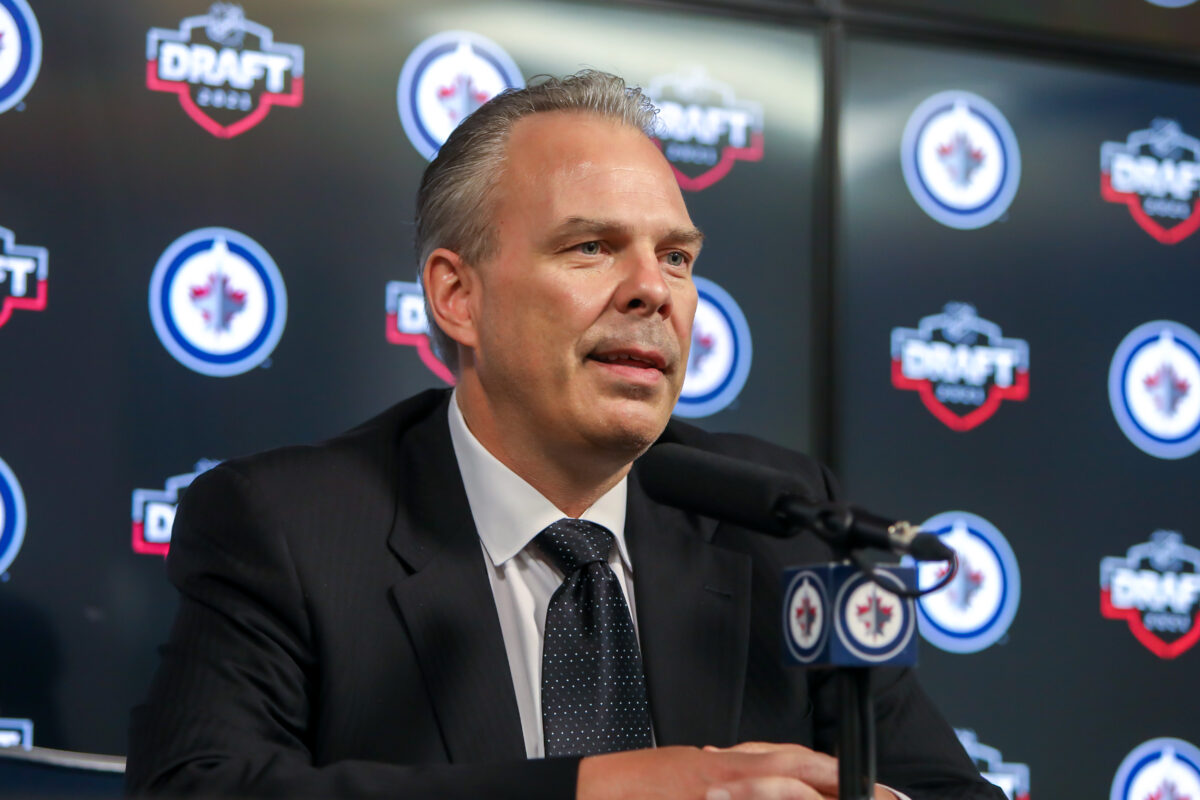
But as The Athletic’s Murat Ates put it, “Cheveldayoff was painted into a corner and snuck out through a secret side door” as he didn’t send Dubois on the seemingly straight-and-narrow road to Montreal. The GM managed to elicit interest from a number of other teams, including the Detroit Red Wings and Ottawa Senators, according to Frank Seravalli.
According to Darren Dreger, the Kings offered the best package of established NHLers. Hughes — just as many suspected — gave a less desirable offer of “future” assets, perhaps believing he was in the driver’s seat and didn’t have to give up a star of his own. The Jets had made it clear they wanted NHL-ready players, not prospects.
Hughes, upon realizing on Tuesday Dubois was heading west, not east, instead acquired Alex Newhook from the Colorado Avalanche for a 2023 first-rounder, 2023 second rounder, and Gianni Fairbrother. This has generally been considered an overpay.
2: Jets Got Two Reliable and Compelling Forwards In Iafallo and Valardi
Neither Iafallo or Valardi are the same calibre as Dubois, but both are reliable forwards who play to their strengths and post strong defensive metrics. Essentially, they are two top-nine players who can play in the top six and ease some of the pain of losing Dubois.
“I think this trade has given us lots of different depth,” Cheveldayoff said Tuesday. “I think each of the players brings something unique and specific to their games that are going to give much greater variety for the coaches to be able to use and make different concepts with.”
Iafallo, 29, is an undrafted left-handed left-winger who can also play centre. He made his NHL debut with the Kings in 2017-18 and in 420-career games with the franchise, has 85 goals and 119 assists for 204 points.
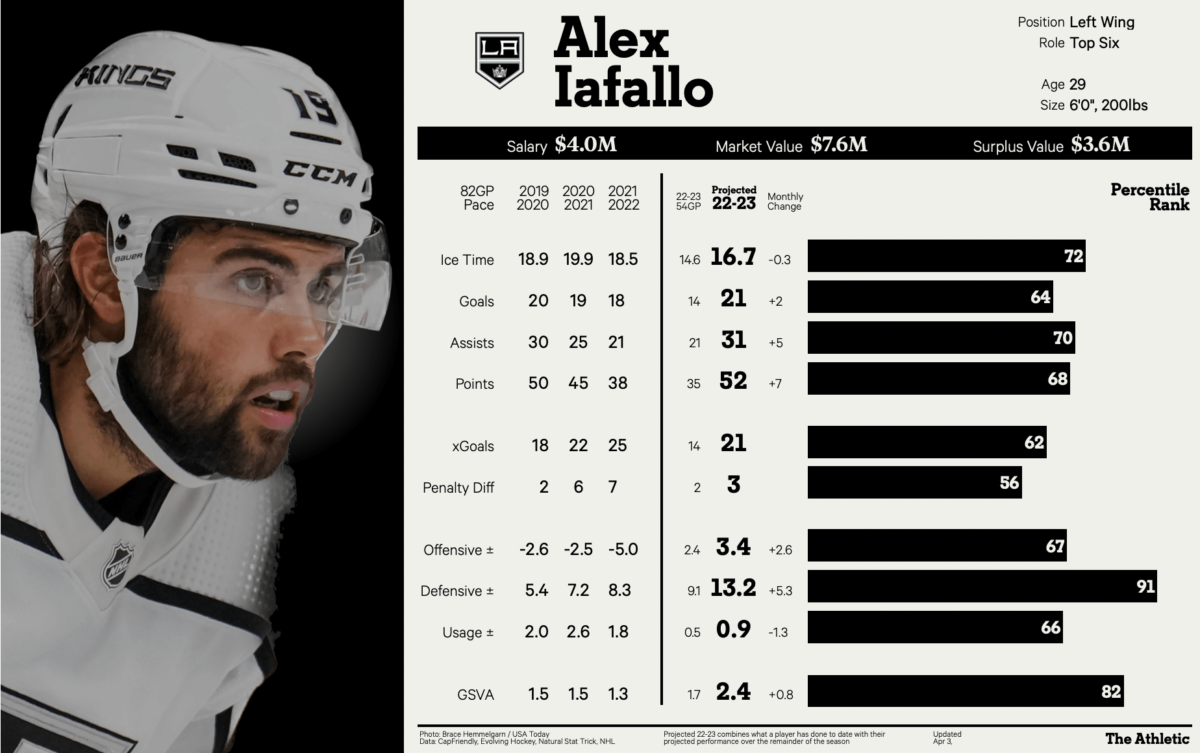
Iafallo is a strong penalty killer and played mainly on a line with Vilardi and Phillip Danault this season, recording 14 goals and 22 points for 26 points in 55 games, a plus-14 rating, and an average time on ice of 16:18. He also had three goals and one assist in six playoff games.
Prior to turning pro, he spent four seasons with the University of Minnesota-Duluth Bulldogs, where he was a teammate of Jets defenseman Neal Pionk.
“He’s a great guy that will bring a lot of experience to our room,” Cheveldayoff said. “He’s a good two-way player, he plays with a lot of energy, that leadership I think he’s going to bring… is going to be a real good mix in the dressing room.”
Vilardi, 23, is a budding star and the key piece of the deal. The right-handed centre and right winger — he is a natural centre but played mostly wing this season — was chosen 11th overall by the Kings in 2017 and is coming off a breakout campaign. He set career highs in goals (23, just four fewer than Dubois) assists (18,) average time on ice (15:36,) and plus-minus (plus-10) and also had two goals and two assists in five playoff games. In 154-career games, he has 41 goals and 37 assists for 78 points.
Related: Analyzing Jets Return for Pierre-Luc Dubois Trade
The 6-foot-3, 215-pounder is noted for his puck-handling ability, hockey sense, and a hard and accurate wrist shot. Prior to turning pro, he spent two seasons with the OHL’s Windsor Spitfires and one season with the Kingston Frontenacs, and in 2016-17, won the Memorial Cup with the Spitfires alongside Jets’ defenseman Logan Stanley.
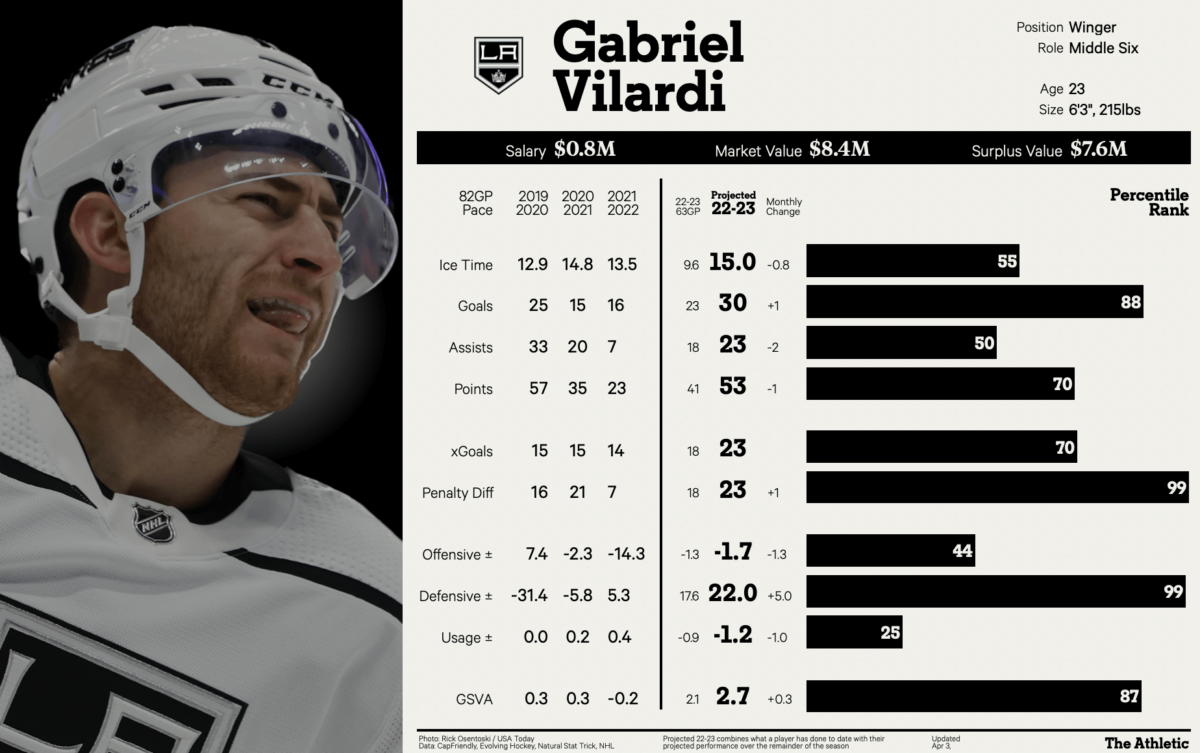
He will be an exciting player to watch in 2023-24 to see if he can build on his momentum. Cheveldayoff noted Vilardi suffered through some injuries in his formative years, but persevered and is “just scratching the surface” of his potential.
3: Moose Didn’t Lose Leading Scorer Harkins
Jansen Harkins was rumoured earlier in the week to be a “throw in” in the deal, but was ultimately not traded. That’s good for the Manitoba Moose, for whom he is a key player and presence.
The 26-year-old forward is a hard worker who, at the AHL level, is a stellar offensive producer. He led the Moose with 25 goals and 50 points in just 44 games this season, and added four goals and seven points in five playoff games. In 200-career AHL games, he has 52 goals and 132 points.
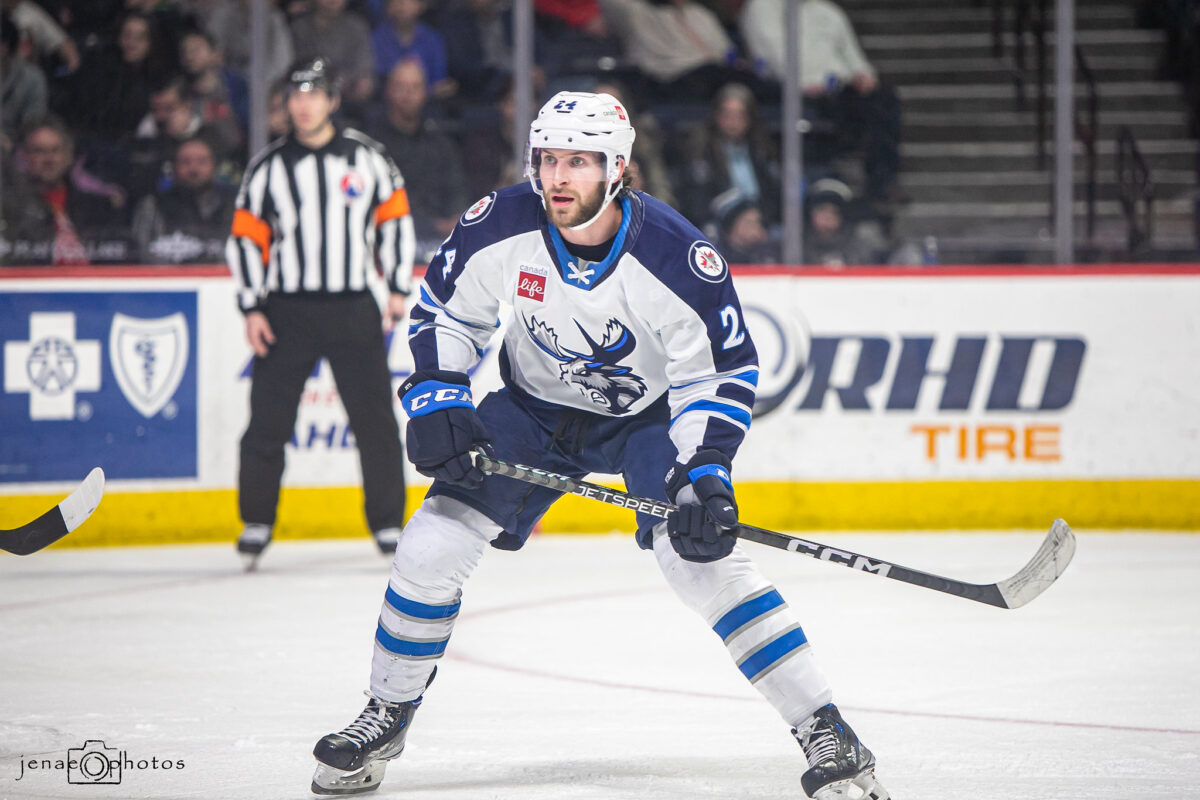
The 2015-second rounder is spark plug and strong competitor, but has not been able to establish himself as a consistent NHL producer. He has played 154 games with the Jets over parts of four seasons and produced 27 points in a bottom-six role.
While Moose head coach Mark Morrison is likely happy he didn’t lose a key forward, Harkins himself probably would have welcomed the change of scenery and a chance with a new organization to do more than toil on the farm.
Cons
1: Kupari Is a Question Mark
This could turn out to be not a con at all (especially considering he isn’t the main part of the deal), but Rasmus Kupari’s ceiling is not entirely clear.
Kupari, a 23-year-old Finnish centre who can also play wing, was selected by the Kings 20th overall in 2018 but has not established himself as a dominant player to this point of his career. The 6-foot-2, 200-pounder has had some flashes of brilliance to be sure, but has struggled with his two-way play, confidence, and consistency.
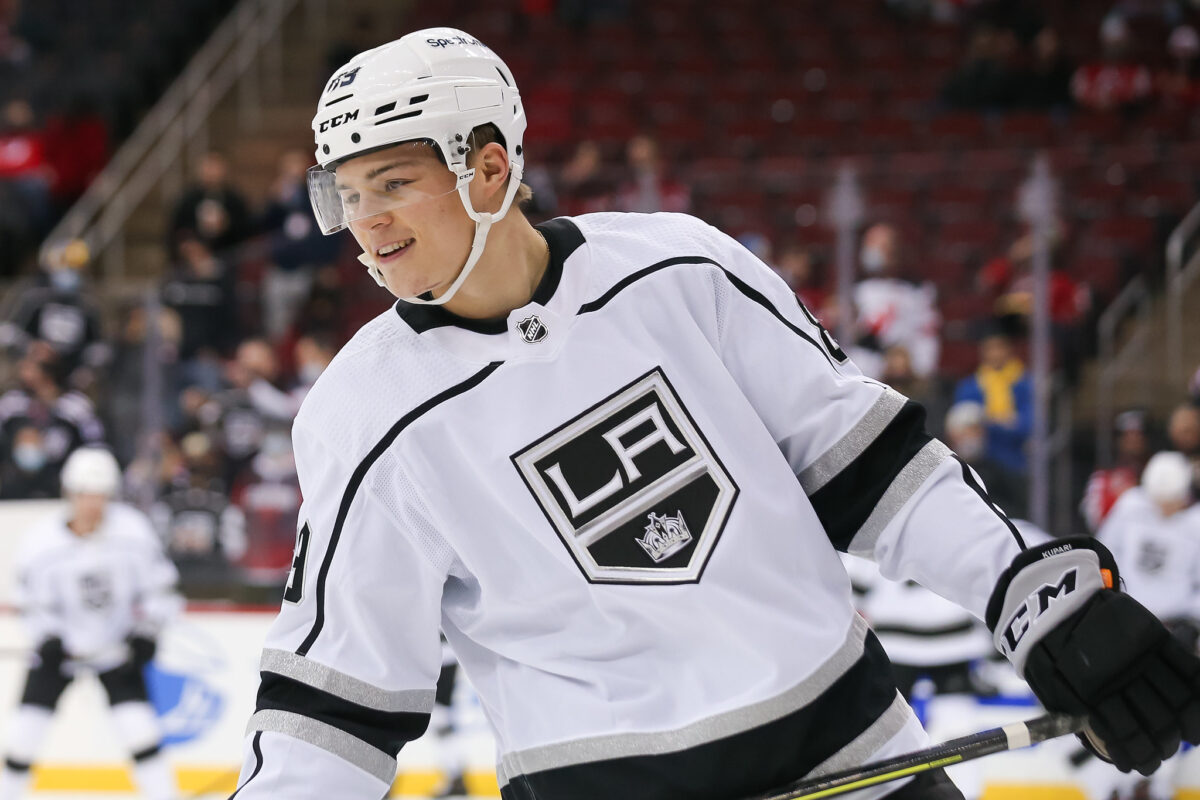
This season, he played a career-high 66 NHL games and recorded three goals and 12 assists for 15 points and won 54.6 per cent of his faceoffs, but in 130-career NHL games, has just 29 points and has bounced between the AHL and the NHL.
Kupari could simply be a late-bloomer offensively, and Cheveldayoff is hoping he turns out better than their last first-round Finnish forward selection, Kristian Vesalainen. Kupari could challenge for a bottom-six role next season and from Cheveldayoff’s comments, it seems he’ll get a shot to do just that.
“Big guy, got lots of speed,” Cheveldayoff said. “I think he can play wing, he can play centre, he’s someone that again is just a young player finding his way right now… Rasmus is someone who given some greater opportunities, is going to blossom. That’s what we’re hoping and what we’re banking on.”
2: New Players Don’t Come With Much (Or Any) Term
The Jets generally try to trade for players who have at least a few years left on an existing contract, since Winnipeg isn’t the most desirable market and has trouble attracting UFAs. None of the players from the Kings are locked up long term and two don’t have contracts, meaning Cheveldayoff has even more on his long to-do list that also includes trading Connor Hellebuyck, trading Mark Scheifele, buying out or trading Blake Wheeler, and considering his UFAs and RFAs
Iafallo has two years left on his current contract that carries an AAV of $4 million. This could be a positive or negative: if Cheveldayoff decides to commit to a rebuild instead of a re-tool, Iafallo’s contract is easily tradeable. However, if he turns out to be an excellent fit, he has the choice to go elsewhere as a UFA after 2024-25.
Vilardi is an RFA who is coming off a one-year contract that paid him $825,000 and is due a significant raise. He cannot become a UFA until 2027, so the Jets are guaranteed at least four seasons of control. However, if he were to sign a two-year bridge deal, in 2025 he could put them into the exact same situation they were in with Dubois.
Kupari is also an RFA coming off his entry-level contract that slid twice. A modest shorter-term deal seems the most probable so the Jets can figure out his ceiling without committing too much of their cap.
Signing RFAs is generally straightforward as they don’t have leverage or the ability to go anywhere else without being offer-sheeted, but we’ve seen with the entire Dubois situation how distracting a difficult RFA can be.
3: Jets Traded Someone Who Once Seemed Destined To Be Their Next Captain
When Cheveldayoff acquired Dubois for Patrik Laine in the January, 2021 blockbuster trade, he didn’t envision Dubois would play fewer than 200 games for the franchise. Indeed, just two-and-a-half years and 195 games later, Dubois is gone. His tenure with the Jets was certainly productive, but also certainly too short.
The Kings are undoubtedly getting the best player in this trade, and one the Jets would have loved to put the C on one day and build around. Dubois, on many nights, lives up to his billing as a true number-one centre and his mix of skill and pure power make him an X-Factor opponents have a hard time dealing with.
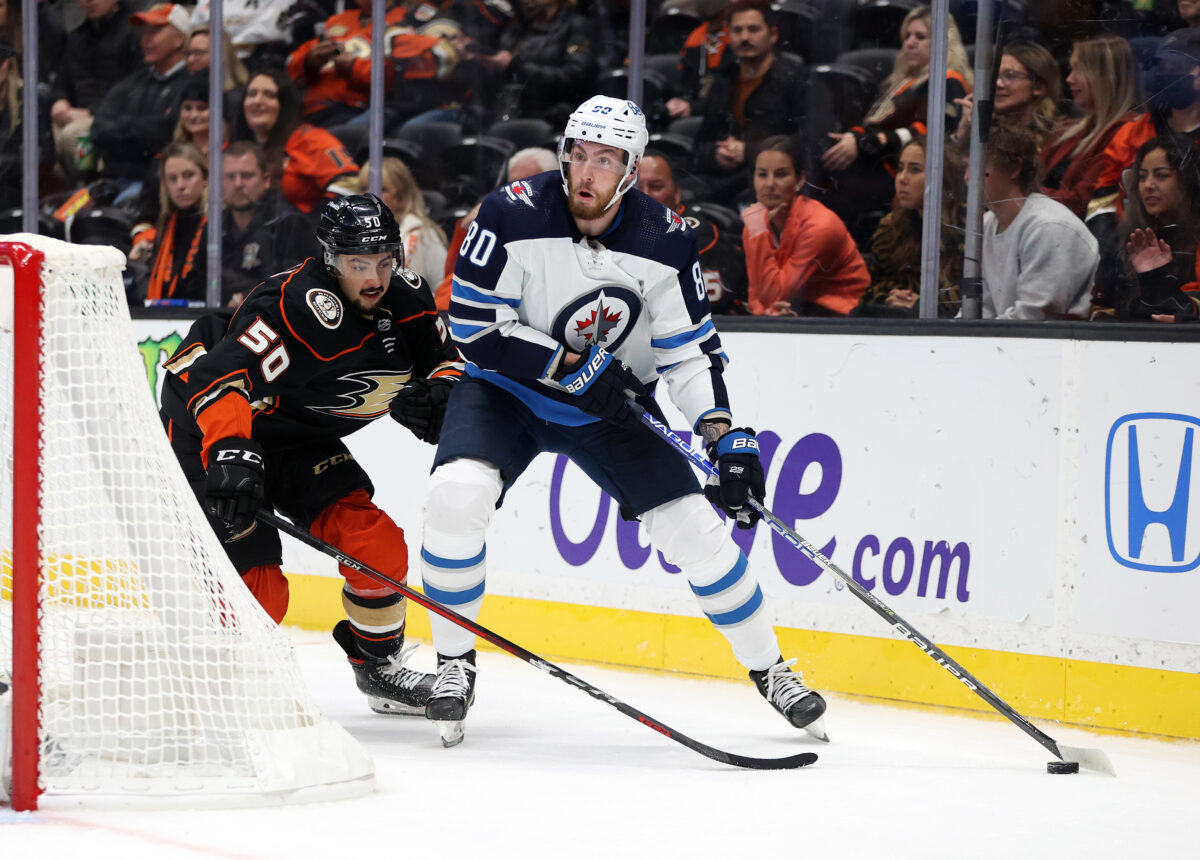
On a Jets team where many core players have phoned it in, Dubois reliably kept his “give a crap” meter at max. He had 143 points as a Jet, and recorded a career-high 63 points — 27 goals and 36 assists — to go along with 77 penalty minutes this season. He can be a key contributor at even strength and a net-front mainstay for a team’s power play and is never afraid to go into the dirty areas or mix it up. This mainly serves him well as he is able to get under his opponents’ skin and draw a lot of penalties.
Related: Jets 2022-23 Report Cards: Pierre-Luc Dubois
We may never know for sure why Dubois soured on — or was never comfortable with — the Winnipeg market. He sidestepped that very question in a Tuesday evening Zoom call, insisting “throughout the whole process there were a lot of questions I had to ask to myself. It’s nothing about Winnipeg,” before going on to praise the organization he wanted out of, the second he wanted to leave in less than three years. (from “L.A. move ‘like a dream come true’: Dubois,” Winnipeg Free Press, June 27, 2023.)
Of signing with the Kings for eight years, Dubois said there’s “absolutely no doubt in my mind that this was a great decision. This was the right decision for me to make.” It will be interesting to see if that holds true. Will he be happy in his new home, or in a few years, will he ask for a ticket out of there as well? Time will tell.
